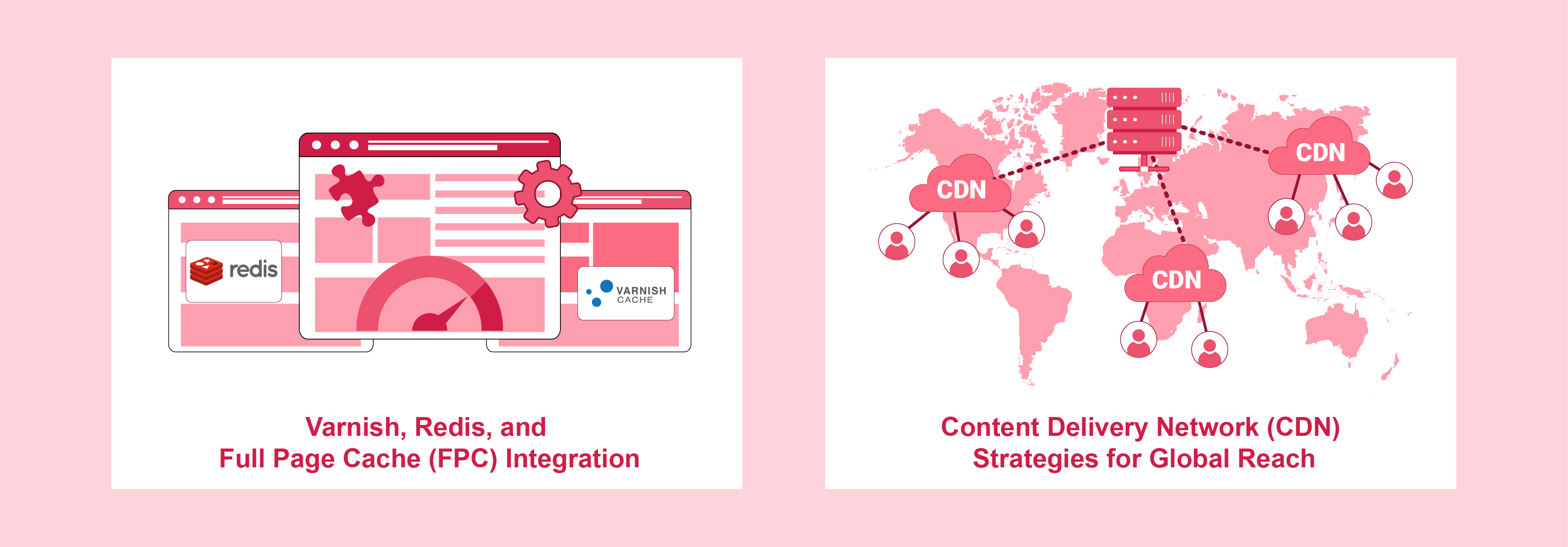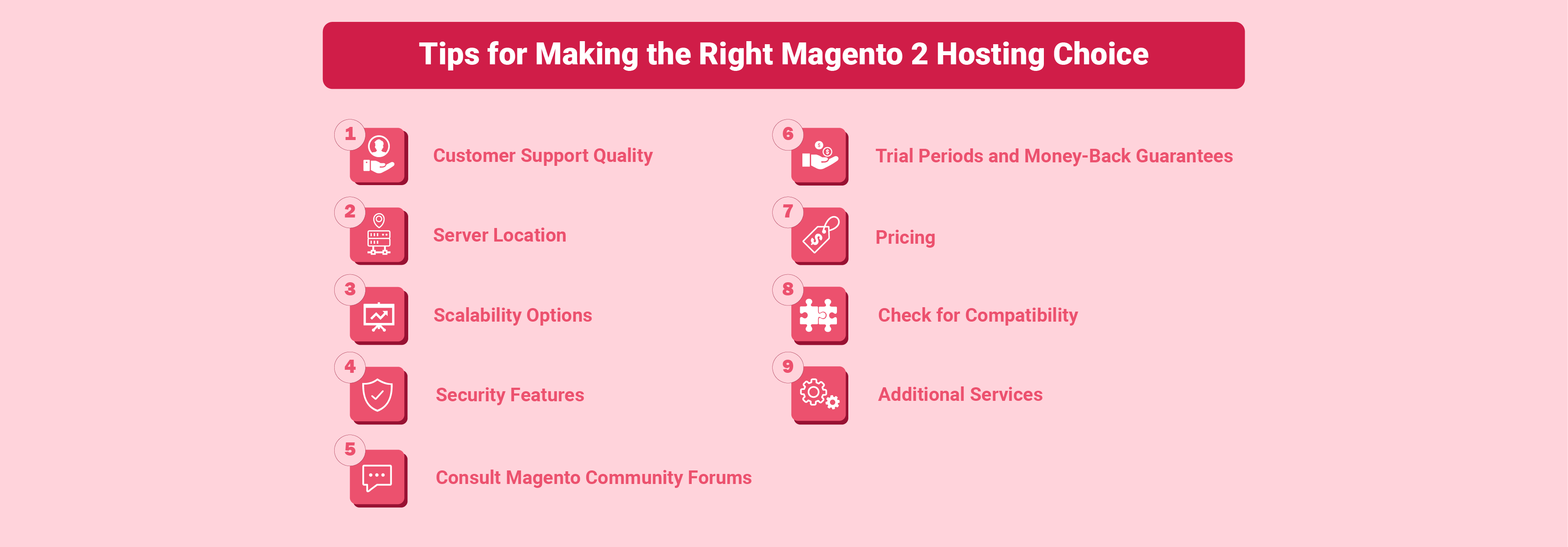
How Best Magento 2 Hosting Provider Boosts Performance
Did you know that a one-second delay in page load time can cause a 7% drop in conversions? This article explores the impact of hosting on your e-commerce site's performance. It covers speed, security, and scalability. Also, learn the primary criteria for choosing the right provider.
Key Takeaways
-
Choosing the best Magento 2 hosting provider is crucial for e-commerce performance.
-
Learn how hosting impacts speed, security, and scalability.
-
Understand the role of hosting in optimizing e-store performance.
-
Discover Magento 2 hosting technologies and their benefits.
-
Find out about performance optimization techniques and scalability solutions.
-
Gain insights into selecting the right hosting provider and key considerations.
-
Understand the importance of managed Magento hosting for business success.
Role of Magento Hosting in Optimizing E-Stores' Performance
Magento hostingg is the infrastructure for building stores. It influences their speed, reliability, and security. A well-structured hosting environment ensures the efficient processing of transactions and smooth navigation.
1. Impact on Speed and Load Times

-
Hosting influences store speed. It offers optimized server configurations.
-
Technologies such as SSD storage, PHP 7.x, and HTTP/2 can reduce page load times. This enhances the Magento user experience.
2. Scalability for Peak Traffic
-
Effective Magento hosting offers scalability options. These options can handle traffic spikes during sales or promotional events.
-
Cloud hosting solutions offer auto-scaling features. Resources adjust based on demand.
-
Load balancers ensure scalability by distributing traffic among servers to avoid overloading. Hosting providers integrate CDNs for faster content delivery worldwide.
3. Enhanced Security Measures
-
A secure hosting environment protects sensitive customer data. It complies with PCI DSS standards.
-
Features like firewalls, SSL certificates, and regular malware scans help mitigate risks.
4. High Availability and Uptime
-
E-commerce sites need 100% uptime to avoid loss of sales and damage to reputation.
-
Hosting providers use redundant systems. They use Magento backups to ensure continuous operation. This is crucial, even during failures.
5. Optimized for Magento
-
Hosting solutions customize to meet Magento's platform needs. They include custom caching mechanisms like Varnish.
-
Integrated Elasticsearch enhances search functionality. Such optimizations ensure that Magento stores perform at their best.
Magento 2 Hosting Technologies
1. Core Hosting Technologies for Magento 2
Web Servers (Apache vs. Nginx):
The choice of web server can impact performance and resource efficiency. Apache offers flexibility, while Nginx offers high performance and scalability.
PHP Configurations and Versions:
Magento 2 requires specific PHP versions for optimal performance. Configuration tweaks and using the latest PHP version can improve response times.
Database Management (MySQL, MariaDB):
A robust database is necessary for storing product and customer data. The choice between MySQL and MariaDB can affect query speed. It impacts site performance.
2. Advanced Caching Mechanisms

Varnish, Redis, and Full Page Cache (FPC) Integration:
These technologies reduce load times. They do this by caching content and database queries. This makes pages load faster for returning visitors.
Content Delivery Network (CDN) Strategies for Global Reach:
A Magento CDN serves content from the nearest server to the user. This reduces latency and improves load times for a global audience.
3. SSL/TLS and HTTP/2 Support
Importance of HTTPS for Security and SEO:
SSL/TLS encryption protects data. It also boosts SEO rankings. Search engines favor secure sites.
Benefits of HTTP/2 for Faster Load Times:
HTTP/2 enables faster data transfer. It improves performance, especially for content-rich sites.
4. Performance Optimization Tools
PHP-FPM and OPcache:
Utilizing PHP-FPM with OPcache can enhance PHP execution times. This makes Magento 2 stores faster and more responsive.
Elasticsearch for Improved Search Functionality:
Integrating Elasticsearch improves search capabilities. It offers quick and relevant results. This enhances the user experience.
5. Security Enhancements
Firewall Configurations and DDoS Protection:
Implementing web application firewalls (WAF) safeguards against common attacks. Adding DDoS protection layers prevents unauthorized access.
Secure SSH and Database Access:
Ensuring secure shell (SSH) access protects sensitive data. Encrypted database connections maintain integrity.
6. Compliance and Data Protection
GDPR and PCI DSS Compliance Considerations:
Hosting environments need to follow legal data protection and PCI standards. They help in for operating in global markets.
Data Encryption and Secure Data Storage Practices:
Data encryption is essential for maintaining customer trust. Secure storage mechanisms are crucial for legal compliance.
Performance Optimization Techniques
1. Tuning PHP and Database for Magento 2

PHP-FPM and OPcache Settings for Magento Optimization:
Adjusting PHP-FPM improves resource allocation. Enabling OPcache reduces TTFB (Time To First Byte). It enhances site responsiveness.
Database Optimization Techniques for Magento:
Clean the database, index and optimize queries. This enhances data retrieval speed. It improves display speed on the store.
2. Leveraging Server Technologies
Nginx + PHP-FPM Setup for High Concurrency:
This setup handles many requests. It reduces load times during traffic spikes.
Utilizing Elasticsearch for Enhanced Search Capabilities:
Elasticsearch speeds up product searches. It improves catalog browsing. This enhances the shopping experience through fast, accurate results.
3. Implementing Advanced Caching Solutions
Configuring Varnish for Magento 2:
Varnish cache serves as a front-end proxy. It decreases server response times by serving cached pages.
Redis Setup for Session and Cache Management:
Redis quickens data retrieval for session storage and cache management. It contributes to faster page loads.
4. Enhancing Front-end Performance
Minification and Merging of JS/CSS Files:
This process reduces the size and number of files. It decreases the data transferred. This speeds up page rendering.
Implementing Lazy Loading for Images and Videos:
Lazy loading defers the loading of non-critical resources. It improves initial load times. It conserves bandwidth.
5. Network and Delivery Optimization
HTTP/2 Implementation:
HTTP/2 features like multiplexing and server push make content delivery efficient.
Quality of Service (QoS) Settings:
Adjusting QoS prioritizes traffic. It ensures critical resource loads are of higher priority.
6. Security and Efficiency
Securing Data with Encryption:
Encrypting data protects sensitive information. It prevents unauthorized access or interception.
Efficient Resource Allocation:
Allocating resources based on traffic and processing needs prevents waste. It ensures smooth operation.
7. Continuous Monitoring and Analysis

Real-time Performance Monitoring:
Monitoring performance in real-time help identify issues. It aids in prompt rectification.
Analytics and Reporting for Optimization:
Analyzing performance data reveals trends and bottlenecks. It guides further optimization efforts.
Scalability and High Availability Solutions
1. Auto-Scaling Strategies for Traffic Spikes
Cloud Hosting Solutions with Auto-Scaling Capabilities:
These solutions adjust resources. They meet demand during traffic surges. This ensures consistent performance.
Load Balancing Techniques for Even Traffic Distribution:
Load balancers distribute incoming traffic across different servers. This prevents any single server from becoming overwhelmed.
2. High Availability Architectures
Database Replication and Failover Strategies:
Replicating databases ensures data is always available, even if one server fails. Failover mechanisms switch to a backup server.
Implementing a Multi-Server Setup for Redundancy:
A multi-server environment prevents downtime. It does so by providing alternative resources if one server fails.
3. Enhanced Data Management for Scalability
Optimizing Data Storage:
Efficient data storage solutions scale with your business. They ensure data retrieval remains fast, regardless of volume.
Data Partitioning Strategies:
Partitioning divides data into manageable chunks. This improves performance and scalability by reducing any database server's load.
4. Dynamic Resource Allocation
Resource Allocation Based on Demand:
Allocating server resources based on real-time demand. It ensures efficient use of resources.
Virtualization and Containerization:
These technologies allow for the quick deployment and scaling of services. They make it easier to manage resource allocation.
5. Disaster Recovery Planning

Regular Backups and Recovery Processes:
Establishing routine Magento backup processes safeguards against data loss. Recovery plans ensure business continuity in case of an outage.
Distributed Data Centers:
Using data centers in different locations reduces the risk of data loss. It ensures service continuity during regional outages.
6. Monitoring and Maintenance for Reliability
Automated Monitoring Systems:
These systems detect and alert on issues in real-time. They allow for immediate response to prevent downtime.
Scheduled Maintenance and Updates:
Updating and maintaining systems prevent vulnerabilities. They ensure the infrastructure remains robust against failures.
Selecting the Best Magento 2 Hosting Provider
1. Checklist for Hosting Features Tailored to Magento
Essential features include support for required PHP versions. Databases need MySQL or MariaDB. Compatibility with Varnish and Redis is crucial for caching.
Providers should offer easy integration with Elasticsearch. They should also offer support for technologies like HTTP/2 and SSL/TLS.
2. Assessing Provider Expertise in Magento Deployments:
Look for hosting providers with a proven track record of successful Magento deployments.
Analyze testimonials from Magento store owners who have used their hosting services.
3. Metrics for Evaluating Hosting Performance:
KPIs include page load times, Time To First Byte (TTFB), and the ability to handle concurrent users.
Use tools like Google Magento PageSpeed Insights, GTmetrix, or Pingdom.
4. Security Audit and Compliance Records of Providers:
Providers should have a strong security protocol. This includes firewalls, malware scanning, and intrusion detection systems.
Ensure they meet PCI DSS if you process payments on your site.
5. Hosting Feature Checklist Table
| Feature | Essential | Recommended |
|---|---|---|
| PHP Version Support | ✔ | |
| MySQL/MariaDB Support | ✔ | |
| Varnish/Redis Support | ✔ | |
| HTTP/2 Support | ✔ | |
| SSL/TLS Certificates | ✔ | |
| Magento Deployment Expertise | ✔ | |
| Performance Metrics Tools | ✔ | |
| Security Protocols | ✔ | |
| PCI DSS Compliance | ✔ |
6. How to Make the Right Magento 2 Hosting Choice

1. Customer Support Quality:
Ensure that the Magento hosting provider offers 24/7 customer support. Support should be knowledgeable about Magento to assist with specific issues.
2. Server Location:
Choose a hosting provider with servers near your target audience. This can improve website loading times and performance.
3. Scalability Options:
Your website's needs will increase as your business grows. Consider hosting providers with scalability options. These can accommodate growth without downtime or major upgrades.
4. Security Features:
Magento websites often deal with sensitive customer information. It's important to choose a hosting provider. They should have robust security features. These include SSL certificates and regular backups.
5. Consult Magento Community Forums:
The Magento community is a valuable resource for recommendations on hosting providers.
6. Trial Periods and Money-Back Guarantees:
Opt for providers that offer trial periods. Also look for money-back guarantees. This allows you to test their service without long-term commitments.
7. Pricing:
While cost should not be the sole determining factor. It is important to compare the prices of different hosting providers. Find a balance between affordability and quality of service.
8. Check for Compatibility:
Before making a final decision, check with the hosting provider. Ensure that their service is compatible with your specific version of Magento.
9. Other Services:
Some hosting providers offer different services. These include website optimization, CDN integration, and advanced security measures. Consider these options if they align with your business needs.
FAQs
1. What is the difference between shared hosting and VPS hosting for a Magento site?
Shared hosting involves different websites sharing a single server's resources. It's a cost-effective choice for small ecommerce stores. VPS hosting provides a virtualized server for more control and better performance. It's suitable for growing Magento sites.
2. Can I get a free SSL certificate with Magento 2 Hosting for my Magento site?
Yes, Magento 2 Hosting includes a free SSL certificate. This is part of its Magento hosting plans. It ensures that your ecommerce store is secure and trusted by customers.
3. What are the benefits of a managed Magento hosting plan?
A managed Magento hosting plan involves the hosting company handling technical aspects. This includes Magento installation, security updates, server maintenance, and more. It lets you concentrate on managing your ecommerce store.
4. How do I choose the best Magento hosting solution for my business?
Review your ecommerce store's size, expected growth, and specific needs. Look for hosting companies that offer scalability. Seek robust security features like a dedicated server or free SSL certificate. Look for specialized Magento support.
5. Why choose Magento cloud hosting for my ecommerce store?
Magento cloud hosting offers scalability, reliability, and performance benefits. It uses servers to ensure your store remains fast, even during traffic spikes.
6. What should I look for in a Magento hosting service if I plan to use Magento for the first time?
Look for a hosting platform that offers easy Magento installation. Seek friendly customer support knowledgeable in Magento. Ensure the hosting server optimization meets Magento's requirements. Consider starting with a shared hosting plan to keep costs low as you learn how to use Magento for your store best.
Summary
Choosing the best Magento 2 hosting provider impacts page load speed and security. Here's what you need to remember:
-
Hosting affects how fast, reliable, and safe your store is.
-
Using cool tech stuff can make your store work even better and handle more customers.
-
Make sure to choose a provider that gets what your store needs and can grow with you.
-
Keep an eye on your store's security and make sure it follows the rules.
By choosing managed Magento hosting, store owners can focus on their business. The host handles all technicalities.




